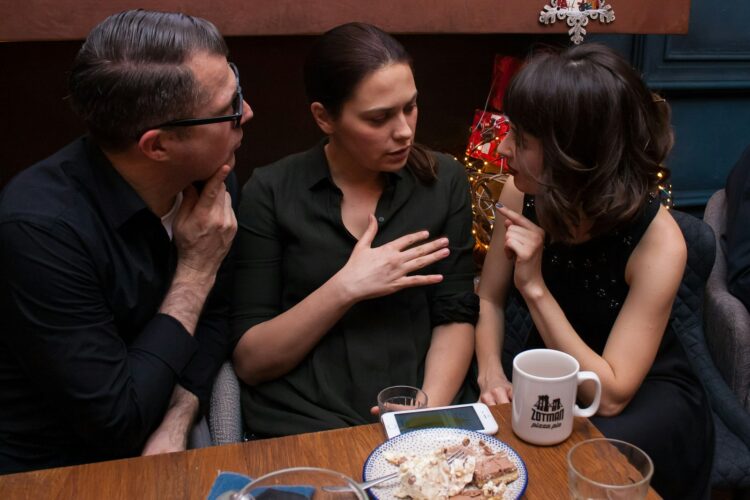
People with high emotional intelligence tend to navigate challenges with more ease, make those around them feel valued, and stay grounded under pressure. If you recognize these signs in yourself, it’s likely you’ve built an inner skill set that many people never fully develop.
You Notice Subtle Changes in Others

You can pick up on the smallest shifts in someone’s tone, expression, or body language. If a friend says they’re fine but their voice sounds tight, you notice and know it’s worth checking in. This attentiveness helps you respond in ways that feel supportive, not intrusive. It’s not about reading minds but about paying attention to cues that often go unnoticed which builds trust and deepens connections.
You Think Before Responding

When someone says something frustrating, you take a moment to process instead of firing back right away. That pause isn’t hesitation—it’s self-control. It lets you consider your words and tone so you can avoid making a tense situation worse. People often appreciate your ability to keep conversations calm, and it keeps you from saying things you might regret later. This habit earns you respect in both personal and professional settings.
You Accept Feedback Without Defensiveness

When someone points out an area where you can improve, you don’t instantly feel attacked. You listen, think about what’s being said and decide how to use it. You might not agree with every piece of feedback but you don’t shut it down right away. This openness shows you’re confident enough to grow and humble enough to admit there’s always more to learn, which makes others more willing to work with you.
You Can Stay Calm Under Pressure

Deadlines, disagreements, or unexpected problems don’t throw you completely off balance. You may feel stress, but you know how to manage it without lashing out or freezing up. Instead of reacting emotionally you focus on finding solutions. This steady presence can make you a reliable figure in tough situations because others know they can count on you to keep things from spiraling out of control when tensions rise.
You Don’t Need to Win Every Argument

For you, being right isn’t always the most important thing. You recognize when continuing a debate will damage the relationship or waste energy. Sometimes you let a minor disagreement go because the bigger goal matters more. It’s not about avoiding conflict, but about choosing battles wisely. This ability shows maturity and an understanding that people value feeling heard just as much as they value being correct.
You Recognize Your Own Emotional Triggers

You know the situations, topics or tones of voice that can set you off. Instead of pretending those triggers don’t exist, you acknowledge them and take steps to manage your reaction. This self-awareness means you’re less likely to blow up unexpectedly or take your feelings out on someone who had nothing to do with the problem. It also helps you explain yourself more clearly when emotions run high.
You Apologize When You’re Wrong

You don’t try to shift blame or make excuses when you realize you’ve messed up. You own it, apologize sincerely and focus on making things right. This doesn’t make you weak—it makes you trustworthy. People respect those who can admit mistakes without letting pride get in the way. Your willingness to take responsibility strengthens relationships,because it shows you care more about fairness and trust than protecting your ego.
You Adapt Easily to Changing Circumstances

Plans fall through, goals shift, and unexpected problems pop up—but you adjust without losing your composure. Instead of fixating on how things were supposed to go, you focus on what you can do now. This flexibility helps you avoid unnecessary frustration and it reassures others that you can roll with changes without making everyone around you feel stressed. It’s a skill that’s valuable in both personal and professional situations.
You Pay Attention to How Words Affect People

You’re mindful of the tone, timing, and phrasing of your words. You know that what you say matters, but how you say it can make the difference between helping someone feel understood and making them feel dismissed. You adapt your communication style to suit the person you’re speaking to, which makes your conversations smoother and more productive. People often open up to you because they feel safe doing so.
You Can Disagree Without Disrespect

You’ve learned how to express a different opinion without making the other person feel attacked. You focus on the idea, not the person and you listen as much as you speak. This keeps discussions from turning into personal battles and encourages mutual respect. People who’ve argued with you often come away still feeling valued, because you didn’t try to belittle them just to prove your point or win the exchange.
You Notice When to Offer Support and When to Step Back

You can tell when someone wants advice and when they just need to vent. Instead of jumping in to fix things right away, you read the moment and act accordingly. This sensitivity prevents you from overwhelming people or making them feel unheard. It’s a balance many struggle to achieve, but you handle it naturally, which is why people often turn to you during difficult times.
You Don’t Take Everything Personally

If someone is short with you or cancels plans, you don’t automatically assume it’s a reflection of how they feel about you. You consider that they might be stressed, distracted or dealing with something unrelated. This mindset spares you from unnecessary hurt and prevents misunderstandings from escalating. By not personalizing every action, you keep relationships steady and avoid adding drama where none is needed.
You Can Comfort Without Making It About You

When someone shares a struggle, you resist the urge to immediately compare it to your own experiences. Instead you focus on their feelings and what they need in that moment. You might share something later if it helps but you don’t shift the attention too soon. This makes people feel truly heard and supported because the conversation stays centered on them instead of turning into your own story.
You Respect Boundaries Without Being Told Twice

If someone tells you they’re not comfortable discussing a certain topic and need space, you honor that. You don’t push or guilt them into changing their mind. This respect for personal boundaries shows you value their comfort over your own curiosity or need for control. It also builds trust, because people know they can be honest with you without worrying you’ll cross a line they’ve set.
You Value Long-Term Harmony Over Short-Term Satisfaction

You think about how your actions now will affect a relationship later. That means you might choose patience instead of reacting sharply, or you might address a small problem early before it grows. Your focus is on keeping relationships healthy over time and not just feeling good in the moment. This ability to look ahead helps you make choices that strengthen, rather than strain and the connections you care about.

